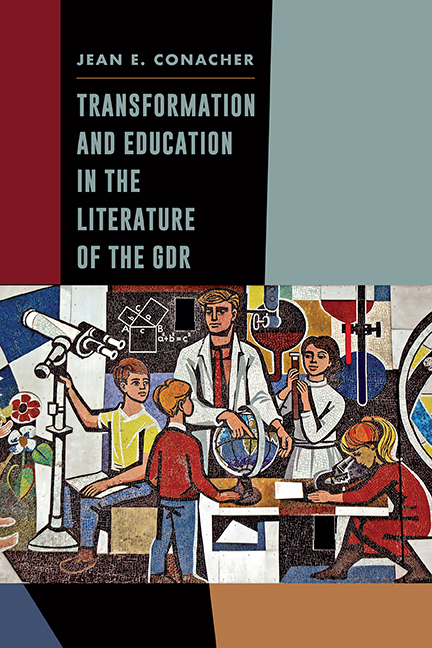Book contents
- Frontmatter
- Dedication
- Contents
- List of Illustrations
- Acknowledgments
- List of Abbreviations
- Introduction: The Postwar Desire for Renewal
- 1 Shaping the Cultural and Educational Landscape in the Soviet Occupation Zone (SBZ)
- 2 Interweaving GDR Education and Cultural Policy toward a National Literature
- 3 Critiquing the Norm in Steinmann' Die größere Liebe, Wolf' Der geteilte Himmel, and Kant' Die Aula
- 4 “Ich bin. Wer?“: Subjectivity and Transformation in Wolf' Nachdenken über Christa T. and Reimann' Franziska Linkerhand
- 5 “Wem geben wir Einsen … ?” Meritocracies and Reward in de Bruyn' Die Preisverleihung and Plenzdorf' Die neuen Leiden des jungen W.
- 6 “Mir geht es gut”: Challenging Stagnation in Hein' Der fremde Freund and H�ntsch' Wir sind keine Kinder mehr
- Conclusion
- Appendix A Text-Internal Functions of Narrative Triangle (Left Side)
- Appendix B Text-External Functions of Narrative Triangle (Right Side)
- Notes
- Bibliography
- Index
4 - “Ich bin. Wer?“: Subjectivity and Transformation in Wolf' Nachdenken über Christa T. and Reimann' Franziska Linkerhand
Published online by Cambridge University Press: 25 March 2020
- Frontmatter
- Dedication
- Contents
- List of Illustrations
- Acknowledgments
- List of Abbreviations
- Introduction: The Postwar Desire for Renewal
- 1 Shaping the Cultural and Educational Landscape in the Soviet Occupation Zone (SBZ)
- 2 Interweaving GDR Education and Cultural Policy toward a National Literature
- 3 Critiquing the Norm in Steinmann' Die größere Liebe, Wolf' Der geteilte Himmel, and Kant' Die Aula
- 4 “Ich bin. Wer?“: Subjectivity and Transformation in Wolf' Nachdenken über Christa T. and Reimann' Franziska Linkerhand
- 5 “Wem geben wir Einsen … ?” Meritocracies and Reward in de Bruyn' Die Preisverleihung and Plenzdorf' Die neuen Leiden des jungen W.
- 6 “Mir geht es gut”: Challenging Stagnation in Hein' Der fremde Freund and H�ntsch' Wir sind keine Kinder mehr
- Conclusion
- Appendix A Text-Internal Functions of Narrative Triangle (Left Side)
- Appendix B Text-External Functions of Narrative Triangle (Right Side)
- Notes
- Bibliography
- Index
Summary
KHRUSHCHEV's FALL FROM POWER in October, 1964, had immediate and longer-term consequences for developments in the GDR, as Ulbricht’s interactions with Khrushchev's successor, Leonid Brezhnev, were complicated by their differing views on the future relationship between their two countries. Catherine Epstein argues that it was Ulbricht's stronger desire for, rather than resistance to, rapprochement with the FRG that caused Brezhnev concern, coupled with Ulbricht's determination for the GDR to be seen as an equal partner rather than as a satellite state of the Soviet Union. Like 1959, 1965 proved a key year for the GDR, the final time that serious, active efforts would be made to intertwine economic, political, and cultural developments so systematically. Where the 1959 Education Act had officially introduced a socialist education system, the 1965 “Gesetz über das einheitliche sozialistische Bildungssystem der Deutschen Demokratischen Republik” (hereafter 1965 Education Act) now looked to consolidate by streamlining a range of initiatives from preschool education to adult vocational training under the common umbrellas of Allgemeinbildung and polytechnische Erziehung. This legislation remained in force for the remaining years of the GDR, shaping the thinking of those educated there well beyond the postreunification extension of the FRG education system across the whole of Germany.
This chapter begins by exploring those aspects of educational policy within the 1965 Education Act that drew writers’ attention in the years to follow. It considers how the new political and economic context impacted upon directions in film and literature, despite closed borders raising hopes among writers and artists for greater intellectual and creative scope. As Irmtraud Gutschke reveals, even Kant now wanted to align himself with this group: “Wir fühlten uns ermuntert, und genau das hat die Obrigkeit alarmiert.” Yet as the end of 1965 saw the introduction of the most comprehensive education legislation to be passed in the life of the GDR, economically the NÖS faced increasing difficulties, and—in part to divert attention from this—a major clampdown on literary and cinematic production ensued.
This turbulent period also provided the impetus for two works, Christa Wolf's Nachdenken über Christa T. (1968) and Brigitte Reimann’s unfinished novel, Franziska Linkerhand (1974), signaling a shift in the adaptation of the socialist Bildungsroman and a new creative direction in the exploitation of educational frameworks as a literary tool.
- Type
- Chapter
- Information
- Transformation and Education in the Literature of the GDR , pp. 111 - 143Publisher: Boydell & BrewerPrint publication year: 2020



